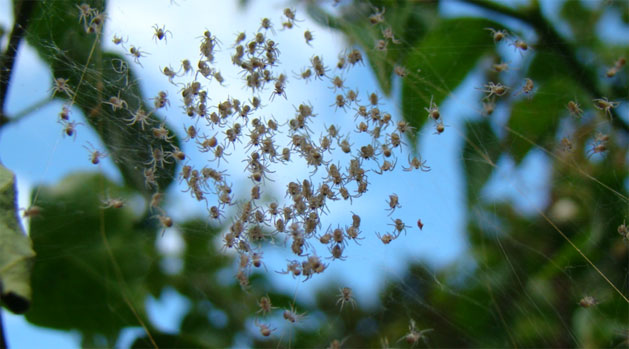'Ballooning' spiders rain down on Australian town
Residents complain of spiders in their beards as countless eight-legged creatures fall from the sky

A free daily email with the biggest news stories of the day – and the best features from TheWeek.com
You are now subscribed
Your newsletter sign-up was successful
An Australian town has been blanketed in webs after millions of baby spiders fell from the sky in a form of migration known as "ballooning".
Residents of Goulburn, New South Wales, tweeted that the town appeared to have been covered by a flurry of snow.
Houses, gardens and fields around the town were soon crawling with tiny spiders. "When I looked up at the sun it was like this tunnel of webs going up for a couple of hundred metres into the sky," Ian Watson told the Sydney Morning Herald. "You couldn't go out without getting spider webs on you… they kept getting in my beard."
The Week
Escape your echo chamber. Get the facts behind the news, plus analysis from multiple perspectives.

Sign up for The Week's Free Newsletters
From our morning news briefing to a weekly Good News Newsletter, get the best of The Week delivered directly to your inbox.
From our morning news briefing to a weekly Good News Newsletter, get the best of The Week delivered directly to your inbox.
Scientists said that the phenomenon is an ingenious migration technique. After hatching, baby spiders climb to a high spot, often into treetops, and use their silk to form a parachute or 'balloon'. When the wind dislodges them, they are carried on the breeze to a new location.
Ballooning, also called 'kiting', allows some spiders to reach as far as the Antarctic. It is believed that it is this ability to travel through the air for up to 25 days without food that has enabled spiders to populate every region on earth.
Naturalist Martyn Robinson explains that ballooning spiderlings can fly as high as three kilometres above the ground, which can give the impression that the spiders are raining from the skies.
Spiders escaping waterlogged ground by using their webs to haul themselves to safety can also contribute to the 'angel hair' effect, which can look liked a dusting of snow.
A free daily email with the biggest news stories of the day – and the best features from TheWeek.com
Robinson assured residents that the spiders were harmless and would quickly disperse.